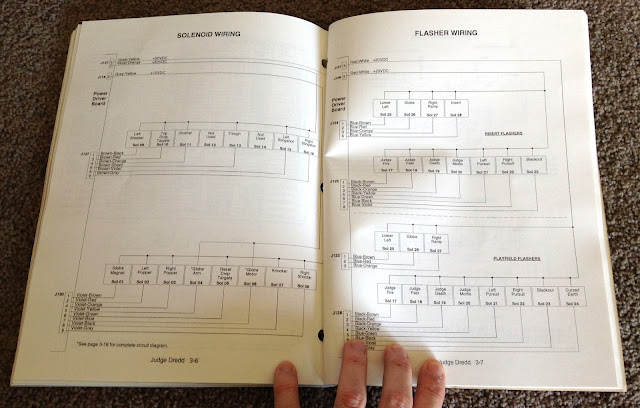There is the mechanical side – The cracking of the flippers, the rattling of the pop bumpers, the thwack of the up-kickers, the skittering of the ball down wire lanes and the chattering as it ascends and descends ramps. Even the mere movement of the ball across the playfield makes a low rumbling sound. Playing a machine with the glass removed is like listening to Lou Reed's 'Metal Machine Music'. Only it's a lot more melodic.
On top of this is the digitally generated sound. Pinball has evolved from the bells, clicks and whistles on old electro-magnetic machines through the Moog synthesizer-style pulses, throbs and wobbles of the 70s/80s to full soundtracks, sampled sounds and voiceovers.
This aspect of the pinball machine is a very important part of the whole experience. The soundtrack is the beat to the whole game. Not only do the voice callouts help the player stay informed to what is going on when they can't take their eye off the ball for too long ('Shoot again', 'Ball locked', 'Extra ball is lit'), but are vital to the machine's theme. The Star Trek: The Next Generation machine would be a greatly diminished experience without the TV show theme and the specially recorded voice work by the actual cast. This includes the majesty of Sir Patrick Stewart himself calling out in full irony-free Picard tones, 'All hands, prepare for multi-ball!'
 |
| Years of painstakingly hard study and craft at the Royal Shakespeare Company culminated in this. |
The Dredd machine has a wonderfully cheesy metal rock soundtrack and a variety of voiceovers. This was I would imagine, the first time the Judges had been given actual voices. Before, the reader of Dredd's adventures in 2000AD would have invented their own voices in their heads. Remember, this was 1993, a beautiful time before the Sylvester Stallone Dredd movie was released and ruined everything. Non-movie machines tended to use local (AKA cheap!) actors for the characters with someone called Tina Fey providing voices for some characters in the Medieval Madness machine whilst she was with the Second City, a improvisational comedy company in Chicago – The home of Pinball. I've no idea what became of her...
Dredd was played by Tim Kitzerow, a voice-over artist who worked on dozens of classic pinball machines like The Shadow, Roadshow and Attack From Mars and videogames like NBA Jam and NFL Blitz. He did a great job, sounding gruff and authoritative without descending into parody like Christian Bale's Batman. I can't seem to find out who did the voices of Judge Anderson and the other characters in the game sadly.
All of this is well and good, but my machine's sound was more like sound leaking from an annoying teenager's headphones on the train rather than a boombox. It was weak, thin and quiet.
A pinball's sound is broadcast across the arcade from a pair of small speakers located in the backbox either side of the dot matrix display, facing the player and a single subwoofer facing down in the floor of the machine to provide some extra teeth-rattling bass. Even with the volume turned all the way up to the max (which normally would mean the machine could be heard from space) the main speakers were quiet and the woofer wasn't producing even the smallest of barks.
The wiring looked fine but the speakers themselves were very dusty, the magnets were badly chipped and the woofer had a connector unplugged and a tear in the cone. Time for them to go.
I ordered a complete replacement kit from Pinball Pro. These new speakers are bigger and a doddle to fit. Simply remove the old speakers and using the included wood spacers, screw in the new ones. All installed, I powered the machine up and hallelujah, the Judge now had nice, super loud sound! Job's a good 'un.
 |
| Original subwoofer on the right, new one installed on the left. Maximum power! |


















